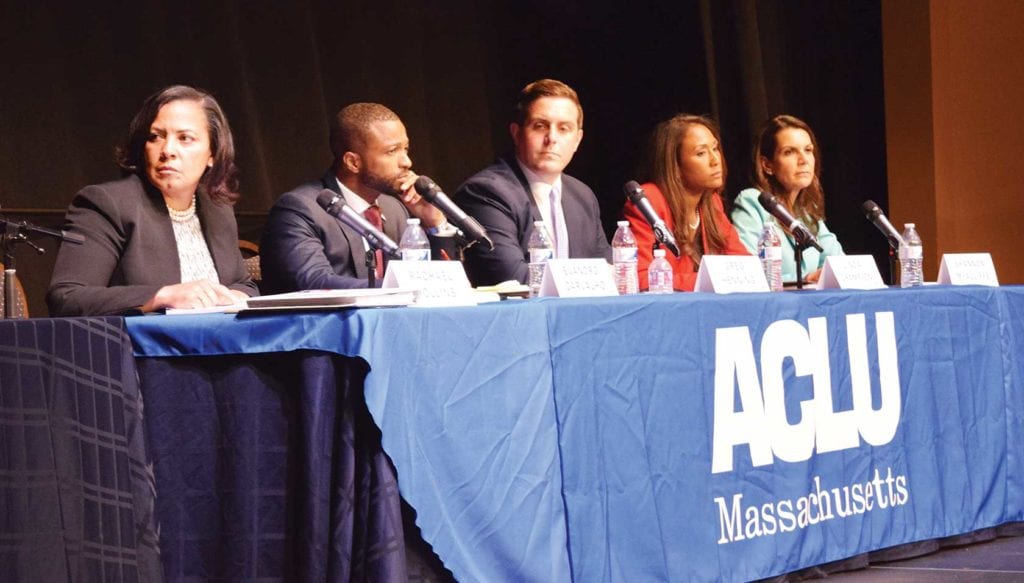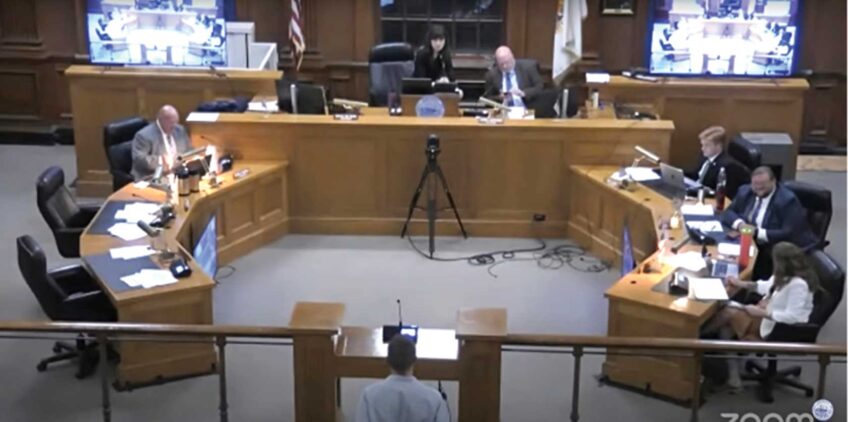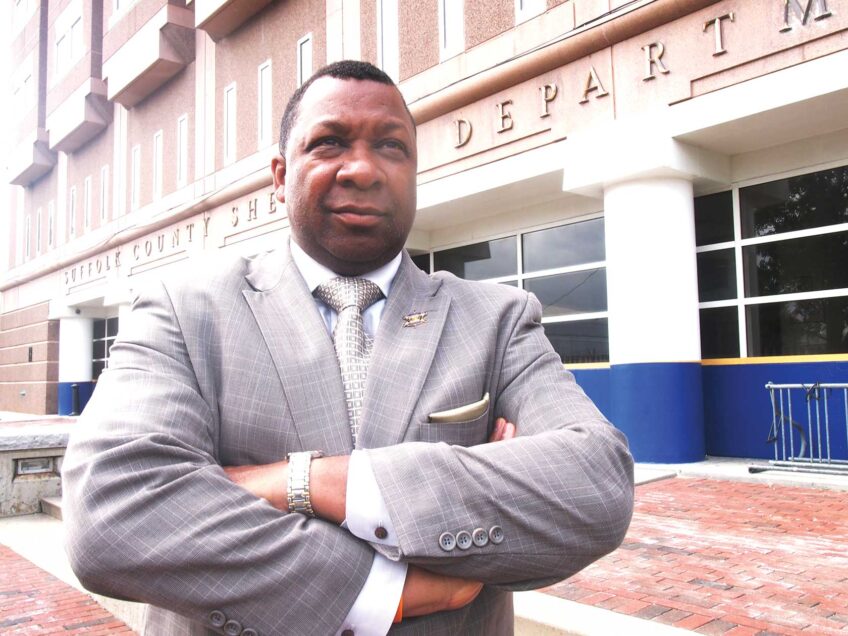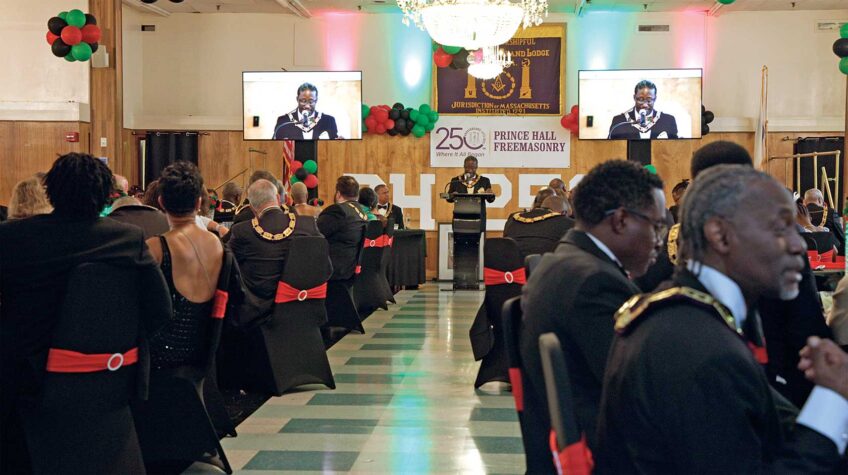Gap widens in district attorney campaign contributions
Henning raises almost $500,000, takes largest share of cop cash

Suffolk County district attorney candidate Greg Henning has the largest war-chest in the race, so far having raised almost $200,000 more than his closest rival as of the candidates’ July 31 filing.
Since announcing his intention to run in March, the former assistant district attorney has amassed $455,485 in contributions, dwarfing the campaign pots of the other four Democratic candidates, according to financial data from the Massachusetts Office of Campaign and Political Finance.
“The reaction to the campaign has been great from the beginning,” said Henning, who said he is grateful for the cash donations, but more so for the unwavering support and willingness to give up weekends from members of his campaign.
Former legal counsel for the MBTA Rachael Rollins has received more than $190,131, followed by defense attorney Shannon McAuliffe, who has raised $189,163. State Rep. Evandro Carvalho raised $90,891 and former Suffolk prosecutor Linda Champion has almost $55,626 in contributions to her campaign kitty. (These figures are as of the July 31 OCPF filing period.)
The amount of contributions made by police officers and members of law enforcement to Henning’s campaign are significantly larger than for the other candidates in the race.
A Dorchester resident and supervisor of the district attorney’s gang unit, Henning has raised almost $60,000 from individual police officers, detectives and law enforcement unions, including the Boston Police Patrolmen’s Association.
The patrolmen’s association and the Boston Police Detectives Benevolent Society donated $500 each to Henning’s campaign, but were unavailable for comment at the time of publication.
The association also gave $500 to Carvalho’s campaign. The union contributions, however, were dwarfed by Henning’s share of $250, $500 and $1,000 contributions from individual officers.
Donation rules state that individuals or associations cannot contribute more than $1,000, and business checks are not allowed.
Henning told the Banner he is grateful to all of his donors, and that “there is no one group whose contribution is more meaningful than any other.” He took the opportunity to emphasize the support he has received from lifelong friends and acquaintances, including his old boss at Charles Street Supply hardware store, his dry cleaner and a former babysitter.
Rollins’ campaign received a shot in the arm last week from New York-based writer and civil rights activist Shaun King, who launched an online funding drive on the ActBlue website, citing Rollins’ “strong platform for justice reform.” His drive has so far raised $25,000 from more than 700 contributors.
Following District Attorney Daniel Conley’s announcement in February that he would not seek re-election after 16 years as head state prosecutor for Boston, Chelsea, Revere and Winthrop, all the candidates vying for the role have campaigned heavily on the issue of criminal justice reform.
The five candidates unanimously support the use of diversion programs rather than prison for young offenders, and want to support non-violent offenders battling substance abuse to find recovery.
However, during a forum hosted by ACLU Massachusetts in Roxbury last June, some differences between the candidates’ stances emerged. Henning and Champion said they would not support an end to cash bails, and would not vote to abolish mandatory minimums for all crimes except murder. Henning also failed to state a commitment to not prosecuting simple possession drug cases.
This focus on reform has led advocacy groups, like the ACLU, to promote the candidates’ campaigns and, in doing so, raise the profile of criminal justice reform efforts.
The ACLU launched their “What a difference a DA makes,” public education initiative, which according to their website, aims to “highlight the key role that the Commonwealth’s district attorneys play in determining the effectiveness and fairness of the criminal legal system.”
But the success of their efforts may be limited if a district attorney in receipt of considerable sums of law enforcement cash is elected.
“Campaign finances is always a complicated issue,” said Rahsaan Hall, director of the ACLU’s Racial Justice Program. “What candidates say on the campaign trail someone should certainly interrogate, but it’s also worth examining who supports them,” because, Hall said, donations can “inform the candidate’s perspective.”
In determining the direction of future criminal justice reform, Hall said “voters should look at these contributions through the lens of their own values.”
If voters feel police practices are problematic and need to change, said Hall, then knowing who has contributed to which campaign “should inform [their] perspective on the candidate’s loyalty and directives.”
Under the Massachusetts conflict of interest law concerning campaign finances for all political races at state, municipal and local level, financial contributions must be fully disclosed. A spokesperson from the State Ethics Commission told the Banner that public disclosure of donations, either by filing records with the Office of Cam-paign and Political Finance or by submitting a written disclosure with the appropriate keeper of records, satisfies requirements within the law, and eliminates the risk of conflict of interest.
All of the candidates in this race have declared campaign contributions, and the list of donors can be found at the Office of Campaign and Political Finance’s website.
The successful candidate in the Sept. 4 primary, will face independent Michael Maloney, a Brockton defense attorney, in the Nov. 6 general election.






